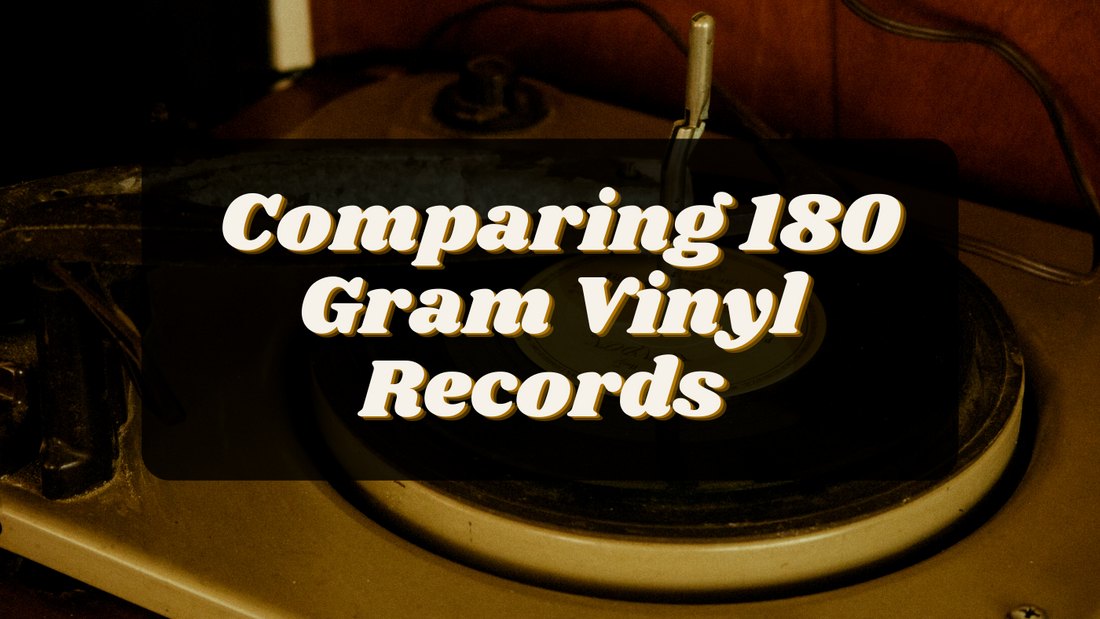Vinyl record collectors and audiophiles alike are always on the lookout for the highest-quality audio experience. And one of the things they usually turn to is the 180 gram vinyl record. But what exactly makes this type of vinyl record so special? In this article, we will be taking a closer look at 180 gram vinyl records and comparing them to standard records to discover the difference in terms of sound, heaviness, and durability.
Introduction to 180 Gram Vinyl Records
180 gram vinyl records are vinyl records that are made from thicker and heavier material than regular vinyl records. This makes for a higher-quality sound, as the thicker material reduces vibration which in turn reduces distortion and noise. The extra weight also helps to provide a more stable platform for the record to spin on, which helps to reduce skips and pops that can occur with regular vinyl records.
180 gram vinyl records are usually made in limited quantities, which makes them more desirable to collectors and audiophiles. Additionally, 180 gram vinyl records are usually more expensive than regular vinyl records, so they are a great way to show off your status as a passionate music fan.
How 180 Gram Vinyl Records Compare to Standard Records
When comparing 180 gram vinyl records to standard records, there are a few key differences that should be noted. The first is the thickness of the material. 180 gram vinyl records are made from much thicker material than regular vinyl records, which results in a heavier record. This extra weight helps to reduce vibration and reduce distortion and noise, resulting in a higher-quality sound.
The second difference is the amount of detail that can be heard on 180 gram vinyl records. The thicker material of these records allows for more detailed sound, which can be especially evident when listening to classical and jazz music. 180 gram vinyl records also have a much warmer sound than regular vinyl records, which can be very pleasing to the ear.
The third difference between 180 gram vinyl records and regular vinyl records is the durability. 180 gram vinyl records are much more durable than regular vinyl records, primarily due to their thicker material. This means that 180 gram vinyl records are less likely to warp or become scratched over time, making them a great choice for collectors and audiophiles.
Sound Quality of 180 Gram Vinyl Records
When it comes to sound quality, 180 gram vinyl records are unrivaled. The thicker material of these records helps to reduce vibration and noise, resulting in a much clearer and more detailed sound. Additionally, 180 gram vinyl records have a much warmer sound than regular vinyl records, which can be very pleasing to listen to.
The sound quality of 180 gram vinyl records is so good that many audiophiles prefer them over digital recordings or CDs. The warmth of the sound and the extra detail can bring music to life in a way that digital recordings simply cannot. Additionally, 180 gram vinyl records can provide a much more immersive experience than digital recordings, as they require more attention and concentration to listen to.
Heaviness of 180 Gram Vinyl Records
One of the main differences between 180 gram vinyl records and regular vinyl records is the weight. 180 gram vinyl records are much heavier than regular vinyl records, which makes them more stable and less prone to warping or becoming scratched. This extra weight also helps to reduce vibration and noise, resulting in a much clearer sound.
The extra weight of 180 gram vinyl records also makes them more durable. The thicker material helps to protect the record from warping, scratching, and other damage that can occur with regular vinyl records. Additionally, 180 gram vinyl records can withstand more wear and tear than regular vinyl records, making them a great choice for collectors and audiophiles.
Durability of 180 Gram Vinyl Records
When it comes to durability, 180 gram vinyl records are the clear winner. The thicker material of these records helps to protect them from warping, scratching, and other damage that can occur with regular vinyl records. Additionally, 180 gram vinyl records are much more durable than regular vinyl records, as they are less prone to wear and tear.
180 gram vinyl records can also last much longer than regular vinyl records. The thicker material helps to protect the record from damage, which can help the record last much longer than a regular vinyl record. Additionally, 180 gram vinyl records are less likely to become scratched or warped over time, making them a great choice for collectors and audiophiles.
Advantages of 180 Gram Vinyl Records
When it comes to 180 gram vinyl records, there are a few key advantages that should be noted. The first is the sound quality. 180 gram vinyl records have a much clearer, warmer, and more detailed sound than regular vinyl records, which can be very pleasing to listen to. Additionally, the extra weight of these records helps to reduce vibration and reduce distortion and noise, resulting in a much higher-quality sound.
The second advantage of 180 gram vinyl records is their durability. The thicker material of these records helps to protect them from warping, scratching, and other damage that can occur with regular vinyl records. Additionally, 180 gram vinyl records are much more durable than regular vinyl records, as they are less prone to wear and tear.
The third advantage of 180 gram vinyl records is their collectability. 180 gram vinyl records are usually made in limited quantities, which makes them more desirable to collectors and audiophiles. Additionally, 180 gram vinyl records are usually more expensive than regular vinyl records, so they are a great way to show off your status as a passionate music fan.
Disadvantages of 180 Gram Vinyl Records
When it comes to 180 gram vinyl records, there are a few key disadvantages that should be noted. The first is the cost. 180 gram vinyl records are usually more expensive than regular vinyl records, so they may not be an option for those on a budget. Additionally, 180 gram vinyl records are usually made in limited quantities, so they can be difficult to find.
The second disadvantage of 180 gram vinyl records is their weight. 180 gram vinyl records are much heavier than regular vinyl records, which can make them more difficult to store and transport. Additionally, the extra weight of 180 gram vinyl records can make them more difficult to spin on a turntable, which can lead to skips and pops.
The third disadvantage of 180 gram vinyl records is their fragility. The thicker material of these records can make them more fragile than regular vinyl records, which can make them more prone to damage. Additionally, 180 gram vinyl records are more likely to warp or become scratched over time, so they may not be the best choice for those who are looking for a long-lasting record.
Conclusion
In conclusion, 180 gram vinyl records offer a number of advantages over regular vinyl records. These records provide a much higher-quality sound, are much more durable, and are more desirable to collectors and audiophiles. However, 180 gram vinyl records also have some disadvantages such as their cost, weight, and fragility.
Ultimately, it is up to you to decide whether or not 180 gram vinyl records are right for you. If you are looking for a higher-quality sound, more durability, and a more collectible record, then 180 gram vinyl records may be a great choice. On the other hand, if you are on a budget or need a more durable record, then regular vinyl records may be a better option.
No matter what type of vinyl record you choose, you can be sure that you will be getting a great listening experience. So if you are looking to experience the highest-quality sound, then 180 gram vinyl records are definitely worth considering.

